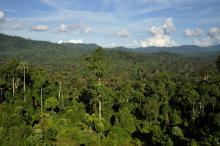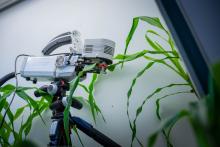The ancestors of a large family of parasites—including those that cause malaria—were equipped to become parasites much earlier in their lineage than previously assumed, according to University of British Columbia (UBC) research.
The work, published in PNAS, traces the emergence of parasitism among apicomplexans—complex, single cell parasites that possess highly specialized tools to invade host cells and tissues.
“Apicomplexans’ ancestors possessed the hardware required to infect other cells long before they diverged from their largely non-parasitic relatives,” says UBC evolutionary biologist Patrick Keeling, lead author on the study. “They just used the tools in a more benign way.”
All members of the apicomplexan phylum evolved from a free-living ancestor hundreds of millions of years ago. But little is known about how, or when, they adapted the specialized organelle that enables them to parasitize animals. Intriguingly, some of their closest relatives are photosynthetic algae that live symbiotically with coral.
To flush out the family tree, Keeling and colleagues used advanced genomic analysis to reconstructed the evolution of the lineage’s infection and photosynthetic processes. Importantly, they combined the genomic sequencing with observations of the structure and behavior of the cells.
“Complex cells like these have flexible behavioural strategies in the wild that the genome alone doesn’t illustrate,” says Keeling. “So we also need to observe how the cells are built and function to get a complete picture of their evolution and their ecological role under different conditions.”
In a related review published last week in Science, Keeling and colleagues outline how important this comprehensive approach is. Other complex eukaryotic cells like algae are key players in major ecosystems such as the world’s oceans. The scientists argue that without stepping up to this challenge researchers risk misunderstanding fundamental properties of these ecosystems.
In addition to malaria, parasites in the apicomplexan family cause toxoplasmosis (usually carried by cats, but also carried by a third of the world's human population) and cryptosporidiosis (which affects the intestines).
The research was supported by the Canadian Institutes for Health Research, the Tula Foundation, and the Gordon and Betty Moore Foundation. Keeling is a senior fellow of the Canadian Institute for Advanced Research.


